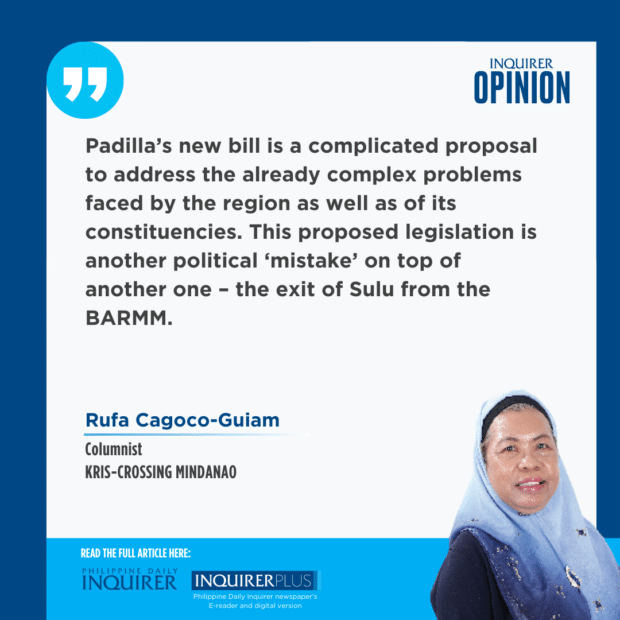
Cotabato City–On Tuesday, Nov. 19, 2024, Sen. Robinhood Padilla filed Senate Bill No. 2879, which aimed to establish another autonomous region to be composed of three island provinces–Basilan, Sulu, and Tawi-Tawi or the BaSulTa region.
Upon hearing this news, top leaders of the current Bangsamoro Autonomous Region in Muslim Mindanao (BARMM) expressed their dismay that one of their ”idols” and perceived champion in the Senate has dropped another bombshell to an already beleaguered region.
Many of them consider this move as “ill-advised” and insensitive to the current problems the region is facing due to the Supreme Court decision last Sept. 9 removing Sulu as a component province of the region.
To recall, the Supreme Court announced its final and executory ruling that the province of Sulu is no longer part of the fledgling BARMM, to be implemented after it was announced. This news spread like wildfire, making all functionaries and leaders in the region, and several civil society organizations confused and bewildered at this sudden turn of events in the already checkered brief history of the transitional BARMM government.
Padilla’s new bill is a complicated proposal to address the already complex problems faced by the region as well as its constituencies. This proposed legislation is another political “mistake” on top of another one–the exit of Sulu from the BARMM.
SB 2879 is not only “ill-advised,” it is fueling another firestorm already generating powerful flames of division in the region. Such divisive national-based policies and decisions hark back to the reign of our two main colonizers–Spain and the United States of America–and these are all referred to as “divide and rule” policy. The two colonizers easily instigated divisions among clan-based communities in Mindanao and its islands many of which have been Islamized starting in 1380 AD, long before the Spaniards came here in the early 16th century.
By filing this bill, Padilla is manifesting his cluelessness of the entire range of dynamics–political, social, and cultural–that gave rise to what the BARMM is now. He may be a Muslim by conversion, but he has not embedded himself in the communities of the Bangsamoro, especially those who are leading the region now as the government of the day–the leaders of the Moro Islamic Liberation Front. He has not seen the suffering of the communities left behind by their heads who had to answer the call for the struggle for self-determination. He has not known how it is to be fighting a war of attrition for more than four decades without being assured of victory at the end. He has not known war on a personal level, since he has not been a part of the Bangsamoro history of struggle.
He has only known war as part of his make-believe world as an actor on the big screen. He may be an effective and charismatic actor. Unfortunately, these are not the main traits required of a legislator, and a national one at that. He may be effective in playing his roles on the reel, make-believe world on the silver screen, but he has not gone through the needed training and experience of how to craft legislation, even at the barangay level.
I would like to believe that as a Muslim convert, he is concerned with the dismal quality of life of many Bangsamoro Muslims in the region. He claimed this during his campaign sorties that convinced Bangsamoro voters to give their vote of confidence to him. Many of these voters have become part of the BARMM bureaucracy and consider him their champion in promoting more favorable legal instruments to benefit them in the region.
The proposed BaSulTa region is not new; it is an arbitrary creation among nongovernment and religious-based organizations to come up with a way to delineate their respective initiatives by location, to distinguish the unique contexts of island communities vis-à-vis the “mainland” provinces of Lanao del Sur and now, the two Maguindanao provinces.
But making it another autonomous region will raise a host of various problems, making it another set of kindling wood to an already existing conflagration that started with the exit of Sulu from the BARMM. First, the proposal will run counter to the 1987 Constitution that allows for only two autonomous regions–the ARMM, now BARMM, and the Cordillera Autonomous Region.
While several sectors have advocated for reconsideration to reinstate Sulu as part of the BARMM, here is a proposal to divide the region once again. This has also raised questions on Padilla’s motives and his avowed concern and empathy for the Bangsamoro. This bill proves otherwise. Most of all, it is a proposal that spells another figurative firestorm in the region.
rcguiam@gmail.com